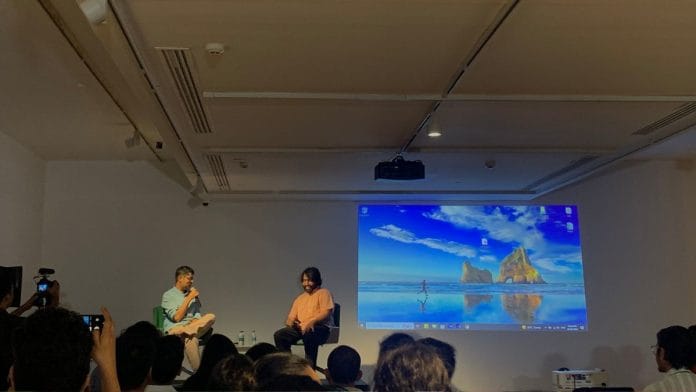New Delhi: I am going to write the ‘Loser Manifesto’ to inspire the youth: said multimedia artist and influencer Anurag Minus Verma at a film screening event in Delhi on Saturday. His target audience? “Jo log vikaas se door rahe,” he added, referring to those “who stayed away from development”. It isn’t what you would expect from an event where Verma and Bollywood writer Varun Grover are in conversation — one for which over 250 people lined up half an hour early.
One would have easily mistaken the long hall in the Kiran Nadar Museum of Art to be a Sarojini Nagar lane — it was packed with a young, excited crowd sporting printed shirts, tote bags slung over their shoulders.
Humour minus drama
The two had come together to screen their short films – Grover’s Kiss and Verma’s three short urban mockumentaries. Verma, known for his iconic criticism of Savarna spaces and caricatures, including the famous ‘Ronnie Malhotra’, presented A Village With 40 Peacocks And 1,000 Humans, Wedding of Babuda, and Time Flies Very Fast Like Rafael Jets.
“You’re a big fan of boredom and velapanti, aren’t you?” Grover asked Verma, to which the latter said that ‘loserism’ can tackle capitalist professionalism. He calls it his ‘personal philosophy’, which is about having no expectations for the future. In the art world, failure is a victory, and there is a need to champion that, he said.
Talking about his art, Verma said that he “enjoys” being bored — if you look at Western cinema or literature, be it Camus or Dostoevsky, “nothing happens” and “there’s music in boredom and in that wandering”. That is what gets Verma really excited, his world a mix of Beckett’s absurdism and Kundera’s slowness. “I see sadness as just a hangover from happiness,” said Verma, in his quintessential emotionally detached style that percolates into his humour too.
The audience at the Kiran Nadar Museum was a houseful of Gen Z, millennials, and young adults frantically looking for good seats — a scene straight out of The Hunger Games. And the few left out were more than happy to stand on the sides for the three hours — just to get a glimpse of Verma and Grover and their works.
In true mockumentary style, Verma documented his hometown in Jaipur’s Ambedkar Nagar and its cultural traditions in his short films. They were all sprinkled with his jibes at Savarna culture.
Contrary to mainstream Dalit representation in movies, where they are shown as either the victims or heroes, Verma said he wanted to show people “just living their life”. He uses comedy as a medium to serve that purpose. The films were about laughing with people rather than at them, someone in the audience pointed out.
In one of his films, Verma shows a groom bowing before guests, seeking their blessings. “Observe this groom here. He has signed up for a good backache after learning some random Brahmanical tradition,” commented Verma in a Modi-Attenborough voiceover.
The audience was left in splits.
Also read: Need for a rural workers union, said Prakash Karat at first P Sundarayya Memorial…
Censors, passion projects & dejection
Grover’s Kiss, though, explored another world of ideas and themes. The 16-minute film, written and directed by Grover, was about a young filmmaker’s tussle with the Indian censorship board, which finds a kissing scene between an old man and his younger adolescent self ‘too long’. The underlying theme is how memory plays with your sensory impulses — two people may experience reality in completely different ways.
The inspiration for the film lay in a past incident when the censorship board asked a filmmaker — he didn’t name who — to shorten a kissing scene from 22 seconds to 16 seconds. The audience started inquisitively whispering among themselves, trying hard to guess the reference.
In 2016, the censor board shortened a kissing scene by half in Do Lafzon Ki Kahani starring Randeep Hooda and Kajal Aggarwal. The same happened when the board shortened the kissing scenes in the James Bond movie Spectre in 2015.
Grover also spoke about the plight of making short films today. It’s his “project of passion”, he said. “No one wants to watch short films, no one wants to make short films, and no one wants to show it anywhere either.”
And how well do such filmmakers get paid? “It’s the same as your one month’s mobile recharge,” Grover said in his deadpan style of humour, evoking grins from the audience.
Toward the end, the audience was treated to a recital of Grover’s poem — Hari patang pe hara patanga from Cycle, a bi-monthly Hindi children’s magazine printed out of Bhopal.
“Ek hai godha do sawaar hai
Teen lok ke chaar dwaar hai
Raat ke panch peher soti hai
Katha shuru aise hoti hai”
(Edited by Humra Laeeq)






